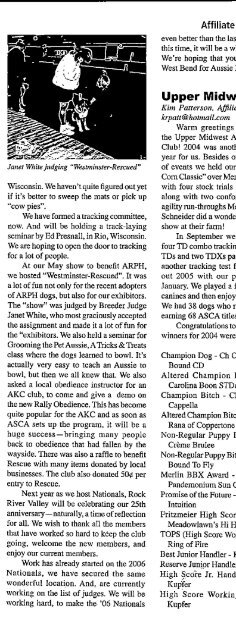Create successful ePaper yourself
Turn your PDF publications into a flip-book with our unique Google optimized e-Paper software.
fairly common and may be so subtle only<br />
the most observant person would notice<br />
them. Others involve ritualized behavior<br />
like "ly-biting"or tail-chasing. A dog that<br />
seems to zone out may be having a mild<br />
seizure..<br />
Seizures originate in the brain at a<br />
specific focus. Over time, the focus can get<br />
larger as it begins to affect adjacent cells.<br />
When this happens the seizures get worse<br />
and what was an occasional space-cadet<br />
episode turns into full-blown seizures.<br />
One pupin my currentlitterhas very small<br />
testicles and another is cryptorchid. I've<br />
placed the cryptorchid in a pet home, but<br />
should I do the same with the other?<br />
The small testicles in the one pup, combined<br />
with the cryptorchidism in his litter brother,<br />
is a reason for concern but not necessarily<br />
one that should wash him out immediately.<br />
Have you discussed this with your vet?<br />
Were there any environmental issues, like<br />
meds given the bitch during gestation, that<br />
may have resulted in small testes?<br />
Ifthe vet doesn't think there's any need<br />
to be concerned, I'd give the pup time to<br />
grow up and start pumping male hormones.<br />
If his testes remain abnormally small you<br />
may want to make sure his semen is normal.<br />
If it is, then I wouldn't worry about it other<br />
than to avoid bitches with a family history<br />
of testicular abnormalities.<br />
Atfour years old, my girl had erlichia<br />
and now, at eight, she has lung cancer.<br />
Didthe erlichia infection sether up to get<br />
cancer later?<br />
While it is true that some infections can set<br />
the stage for later cancers, I'm not aware of<br />
any research linking erlichia and any type<br />
of cancer.<br />
Typically, lung cancer is caused by<br />
inhaled carcinogens such as second-hand<br />
cigarette smoke. There was a study a few<br />
years back that showed dogs owned by<br />
smokers were at higher risk for this type<br />
of cancer. Since dogs do a lot of snuffling<br />
along on the ground, it is also possible for<br />
them to inhale something that might set<br />
them up for lung cancer down the line.<br />
How much consideration isgiven to stress<br />
being a triggerfor some of the immune<br />
systemproblems, sincestresscan lowerthe<br />
immune system's response to disease?<br />
Therolestress plays inanydisease probably<br />
varies from individual to individual and<br />
from one time to another. Some of us.<br />
Q&A<br />
both dog and human, handle stress better<br />
than others. At some point in our lives, all<br />
of us experience stress.<br />
There is no doubt that stress affects<br />
immune system function and not just by<br />
making you more susceptible to whatever<br />
bugs might be around. I can remember<br />
the ophthalmologist who treated my<br />
autoimmune eye disease telling me to avoid<br />
stress. I was going through a divorce at the<br />
time and told him if he could come up with<br />
a way to have a stress-free divorce, we'd<br />
write a book and get rich!<br />
While there is no way to put exact<br />
figures on it, stress can affect the immune<br />
system in several ways:<br />
• Lower ability to resist infection<br />
• Trigger immune-mediated diseases<br />
• Decrease the system's ability to destroy<br />
potentially cancerous cells<br />
Stress is not a good thing if you have<br />
too much of it or don't handle it well.<br />
Negative stress events are fairly obvious,<br />
but even positive things (marriage, new<br />
baby, moving to a new home, new job,<br />
holiday gatherings) can induce stress for<br />
people. Positive stressful events from your<br />
dog's point of view, would include things<br />
that cause major excitement or significant<br />
changes in routine.<br />
How can you say epilepsy is not caused<br />
by a dominant gene with incomplete or<br />
variablepenetrance when it's notdifficult<br />
tofindcurrent-daygeneticists referring to<br />
these as a suspected mode ofinheritance<br />
for one thing or another?<br />
True, they do. However most, when<br />
pressed, will admit that they aren't sure why<br />
Significant Aussie<br />
Internet Lists<br />
a trait does that. Incomplete and variable<br />
penetrance are "science-speak" for "I don't<br />
know what the heck is happening here." But<br />
you can't put the latter in a peer-reviewed<br />
journal.<br />
I tried a few years back to find one<br />
single solitary trait that was proven to be<br />
single-gene dominant with incomplete or<br />
variable penetrance. I corresponded with<br />
researchers I know and put the question to<br />
discussion lists on which researchers with<br />
an interest in canine genetics participate.<br />
Nobody could come up with any.<br />
Zip. Zilch. Nada.<br />
Traits of this type may have a single<br />
major gene, but even so the variation in the<br />
trait suggests additional causes. They are<br />
almost certainly either polygenic or have<br />
a significant environmental aspect. I don't<br />
think anyone questions that environment<br />
plays a role in many genetic diseases. Hip<br />
dysplasia is a classic example, autoimmune<br />
diseases are environmentally mediated and<br />
some epileptic dogs seize only in certain<br />
situations.<br />
Too often, breeders fall into a selfdefeating<br />
trap by grasping at the straw of<br />
variable/incomplete penetrance to mean<br />
that a problem, whatever it is, most likely<br />
came from the other parent, not their own<br />
animal. Please don't do this. In the long run<br />
it will hurt you, dogs, and the breed.<br />
ASCA-L — You must be an ASCA memberto join. To subscribe, simply<br />
send an e-mail to llstservf5)aDDle.ease.lsoft.com. In the message body,<br />
write "Subscribe ASCA-L Firstname Lastname."<br />
Aussie-L— Anyone can join.Tosubscribe, simply send an e-mail to<br />
Iistserv@aDDle.ease.lsoft.com. inthe bodyofthe message, write<br />
"Subscribe Aussie-L Firstname Lastname."<br />
ASKAOpenForum — httD://arouDS.vahoo.com/Qroun/ASKAODRnFnnim/<br />
Aussie-Herders — httD://QrouDs.vahoo.com/arQUD/Aussie-Herder.R/<br />
AUSSIE TIMES I <strong>July</strong>-<strong>Aug</strong>ust <strong>2005</strong> 77



